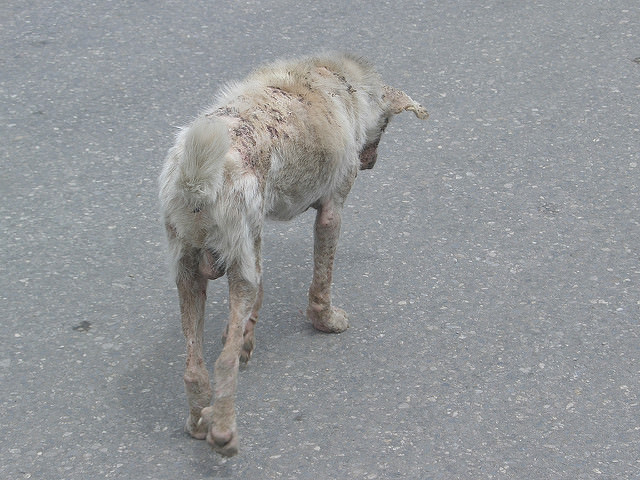What is the first thing that comes to mind when you see your dog scratching? Allergies? Fleas? Mange? Any of these could be reasons your dog is having constant scratch-fests, and figuring out the source of his itchiness is the first step in providing relief. Below are some of the most common reasons dog owners bring their pets to see me when the scratching starts.

Inhalant allergy (atopy)
Atophy is a very common cause of pruritus (itching). I see patients for itching and paw licking all the time, but strictly inhalant cases are most affected spring through fall. Most of my atopic patients are allergic to pollens, molds and dust. Different pollens have specific seasons and sometimes I can review the chart of the patient’s flare ups and have a guess.
Patients that are allergic to ubiquitous agents like house dust will exhibit itching all year long. Some people estimate that 1 in 10 dogs will suffer from atopy, but I think that in my patients, it might be even more than that (maybe because of my region of the country also- the Southeast is home to so many trees and grasses and the temperate weather encourages mold growth too).
Atopy is not curable, but can be effectively managed with your vet’s help. In my opinion, just giving your dog a Benadryl is a poor idea because you may be only making your dog sleepy and not treating anything. Let your vet tell you whether or not your dog may be atopic.
Food Allergy
Dogs can suffer from allergies to their food, but your vet need to be the one to make this diagnosis. It is not as common as atopy. In order to diagnose a food allergy, your vet will place your dog on a FOOD TRIAL. He/she will prescribe a prescription diet that must be fed exclusively (no treats, no naturally flavored medications, nothing but the diet) for a set length of time.
In my opinion, there is less value in the blood tests for food allergy. Food allergy is so complex that a truly reliable test has not been found. If your dog’s itching resolves during the food trial, it is advised to add in other ingredients, one at a time and watch for recurrence of signs. Only after the lengthy process can your dog truly be diagnosed with food allergy and the allergen identified. Be aware that gluten sensitivity is very rare in dogs, so your dog does not need to eat a gluten or grain free diet, unless your vet tells you so.

Mange
Mange can also cause itching and hair loss. There are two types of mange, demodectic and sarcoptic. Demodex is a mite that can live on normal canine skin, but if the dog lacks a good immune response to it, the mites will overgrow and cause itching and alopecia (hair loss). Your vet can find this mite on affected dogs’ skin with a scraping and a microscope. Early treatment is critical because there is a genetic predisposition and if your dog matures completely with the mite still overgrowing, there is a chance that his immune system will give up and accept the mites’ presence, leaving little hope for a cure.
Sarcoptic mange is the contagious one and your dog will be very itchy with patchy hair loss. He may have itchy crusts on his ears and underside and there is even a chance that the people in your home could become infected. Don’t worry. It is self-limiting for people, but if you think that your dog could have sarcoptic mange, see your vet (and maybe your physician) as soon as possible.
Ringworm
Ringworm (Dermaphytosis) is not really a worm. It is caused by a fungus. Dogs can become infected from the soil or other animals. The itching and hair loss may appear to be circular (hence the moniker “ringworm”), but other skin disease can look very similar. Your vet can perform a culture for the organism to be sure and since this is a zoonotic disease (one that you can catch), it is wise to rule it out completely and not guess. Ringworm lesions can become infected with bacteria as a secondary invader and can spread to other parts of the dog. Itchy circular lesions should be examined by a vet to make sure you are not at risk of infection yourself and to treat your dog as well.

Fleas
Fleas are the number one most common cause of itching in my patients. Ctenocephalides felis (cat flea) is the most common ectoparasite in North America. Even though her name is “Felis”, she loves dogs too. She is ubiquitous in environments with higher than 50% humidity. Only one stage (adult) of the flea life cycle is seen on animals and they only stay on the animal long enough to get a blood meal and lay eggs. The other three: eggs, larvae and pupae are an environmental infestation. This is the reason most of my clients think that their pets have no fleas, but they probably do. Make sure that your pet is on a strong, but safe veterinary flea product. (Beware of counterfeit products, see Beware: Counterfeit Flea Products Sold Online, Find Out How To Spot The Difference)
Fleas, Sarcoptic Mange and Ringworm are curable causes of itching and all three can be shared by pets and people, so let your vet help you. Allergic Disease is not curable, but can be managed and you will need a good relationship with your veterinary team to get the best care for your dog. If your dog is itching, certainly insure that he is clean and flea free. Sometimes washing away the allergens with a good bath can help temporarily too. Don’t be tempted to dose him up with Bendryl. Ask your vet to tailor a treatment plan for your dog that includes diagnostic testing to be sure what the cause is, for his sake and yours.
Please look me up on Twitter, Facebook and Google+ . I love hearing about your pets!
